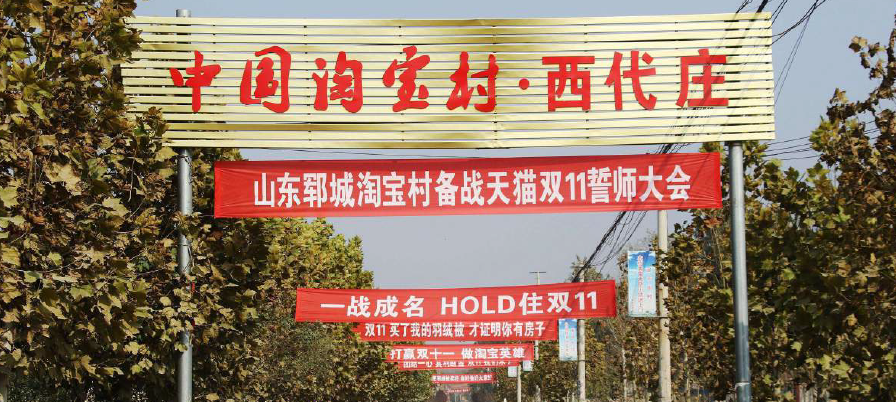The rapid development of digital technology has empowered a wave of e-commerce entrepreneurship adapting to and benefitting from Alibaba's online business model over the past several years in China's rural areas. With more and more Taobao entrepreneurship fostered in specific villages, the “Taobao Village” is defined as a village that has: (1) more than RMB 10 Million in online sales, and (2) >100 online shops or 10% of households operating online shops.
The number of Taobao Villages has increased rapidly in recent years, mainly concentrated in the eastern region. From 2009 to 2020, Taobao Villages have increased from 3 to 5425, a growth pattern which corresponds the booming digitalized economy as well as the process of digitalization-driven rural transformation in China.
As of 2020, there were 5425 Taobao villages across 28 provinces, autonomous regions and municipalities, 148 cities, and 517 counties and districts, areas which combined have a total population over 350 million.
The Taobao Village development model is marked by its clustered development and proliferation. The most famous examples are Yiwu of Zhejiang Province, Cao County of Shandong Province, and Yongkang of Zhejiang Province, among others.
Taobao Villages have generally experienced three distinct development stages:
1. Embryonic (2009-2012): Grassroots entrepreneurship was fostered, and spontaneous growth was based on self-owned courtyards;
2. Expansion (2013-2017): Clustered development of grassroots entrepreneurs became visible with governmental support including the government-led rural e-commerce development program, thus indicating that industrialized development is taking shape;
3. Explosion (from 2018 on): Rural online shops are run as enterprises which could be regarded as "new-type" industrialization, contributing to ecosystem-building, community construction, and governance innovation.

Achievements
In 2020, Taobao Village total annual sales topped RMB 1 trillion (about USD 153 billion).
Many successful cases of Taobao Villages continue to spring up, and new models are formed to further expand and implement this model in other villages to promote poverty reduction.
A decade of experience from Taobao Villages can be summarized in three aspects:
• Grassroots entrepreneurs are the primary drivers of the development of Taobao Villages;
• Governments provide vigorous support through infrastructure, public services, and ecosystem-building;
• Platforms such as Alibaba empower grassroots entrepreneurs.
1. Suining County, Jiangsu Province: Shaji Model
Young residents in Dongfeng Village, Shaji Town, set up a shop on Taobao
Marketplace to sell furniture in 2006, which turned out to be hugely successful. The explosion of their online sales drove the development of industries including processing and manufacturing, accessories, and raw materials as well as logistics and express delivery, giving birth to furniture industry clusters. In 2019, Shaji Town, now home to 16,400 furniture e-tailers, 1,100 production-oriented enterprises, and 136 logistics companies, saw its annual sales of furniture e-commerce business reach RMB 12.5 billion. This achievement has been hailed as the result of “the massive synergy between rural grassroots creativity and the vast online market.”
2. Heze: Taobao Village model helps lift 57 provincial-level impoverished villages out of poverty
A total of 396 villages in Heze City, Shandong Province have become Taobao Villages. Over 500,000 residents in the city benefited from local job opportunities created by the expansion of Taobao Villages' industrial chain. 57 provincial-level impoverished villages have been lifted out of poverty after evolving into Taobao Villages. Thanks to the development of e-commerce, 6,117 registered impoverished households in the city have been lifted out of poverty.
Experiences
Taobao Villages demonstrate their economic and social value through increasing farmers' incomes, helping migrant workers engage in home-based entrepreneurship, providing flexible employment, increasing industrial prosperity, reducing and alleviating poverty and promoting rural revitalization.

Notably, Taobao Villages were found to promote poverty reduction and alleviation:
• 119 Taobao Villages are located in 41 state-level impoverished counties;
• Annual e-commerce transaction volume reached RMB 4.8 billion (about USD312 million) in Taobao Villages located in state-level impoverished counties.
In the next decade, the Taobao Village model will continue to serve as a digital engine for rural revitalization in China. There are few associated trends and perspectives of interest noted below.
• A new industrialization system based on Taobao Village clusters will emerge. The new system of industrialization will be driven by new infrastructure, new factors of production and new service systems.
• Towns will form the core units of rural e-commerce in central & western regions.
In the central and western regions, the towns and townships will be the core units in the development of rural e-commerce, which is different from southeast coastal regions where villages are the core units.
• Taobao Villages will be further developed in the central and western regions of China. There will be over 20,000 Taobao Villages across the country, creating over 20 million jobs.
• Taobao Villages will expand from business innovation to social innovation. The industrial development of Taobao Villages will underpin the overall optimization of the living environment in surrounding areas and modern transformation of the rural governance system.
• Taobao Villages will spring up all over the world. The value of the Taobao Village model has garnered increasing attention from international organizations such as the World Bank as well as foreign governments. For example, the Thai Ministry of Commerce drew on the model of Chinese Taobao Villages to launch an "online initiative," and other countries may also come to model their own initiatives along these lines in the future as well.
Related Links:
1. Government Support for Village Informatization
http://www.wfpchinacoe.net/2022-09/07/content_78401975.shtml
2. Practices of Agricultural and Rural Informatization in China
http://www.wfpchinacoe.net/2022-09/07/content_78402014.shtml
3. Stories of Rural E-commerce Fostering Grassroots Entrepreneurs
http://www.wfpchinacoe.net/2022-09/07/content_78402054.shtml
Source:
Success Stories of E-commerce—Experience from China
http://www.wfpchinacoe.net/2021-04/01/content_78109422.shtml
For more information, please contact WFP China COE (wfpcn.coe@wfp.org)
Category
A New Online Business Model in Rural Areas –Taobao Village
Contributor
A New Online Business Model in Rural Areas –Taobao Village
Country
Case Study

